When all schools in Kansas shut down in March in response to the COVID-19 pandemic, education majors at Newman University were dealt a double blow. Not only did they have to adapt to the online learning model Newman University moved to after spring break, they lost out on in-classroom student teaching time that comprises a valuable part of their education. Being in a school classroom provides an actual hands-on setting for Newman education majors to apply and further learn teaching and classroom management skills
For Kaitlyn Stallard, Morgan Owings and Kaitlyn Blevins, their experiences varied, based on what was happening at the schools to which they were assigned.
Kaitlyn Stallard
Kaitlyn Stallard ’20 was student teaching at her own parish and former elementary school, St. Mary Catholic School in Derby, Kansas.
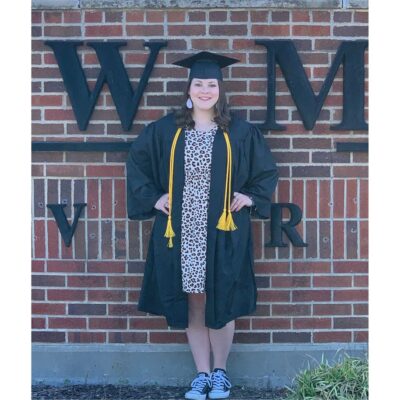
The school closings came as a shock to her and teachers across the state. When she was told that she wouldn’t be able to return to the classroom, she said she panicked and cried.
“I cried and then immediately called my cooperating teacher and talked to her about it,” she said. “The diocese gave us the rest of spring break before we jumped into planning, but the rest of that week was a blur of trying to figure out how all of the online learning would work and waiting for word from the university about how student teaching was affected.”
Stallard definitely felt the benefits of being familiar with the staff and the school when COVID-19 restrictions hit.
“I did have a unique experience, and it definitely benefited me during the pandemic. Because I am part of the parish and school community, I was fully brought into distance learning. I was in every staff meeting, every hallway meeting with grades three through five, I was active in Google Classroom daily with the kids and I was in all of our fourth-grade Zooms.
“St. Mary also decided to look at a new math curriculum and have a presentation and I was allowed to sit in on that as well. I was part of all of the decisions that were made for fourth grade. I was never left out, which was pretty amazing. I know, unfortunately, many of my peers didn’t have the same experience.”
Stallard spent two years substitute teaching before student teaching. She thought those two years helped her find her teaching style but it all changed when she was assigned to a fourth-grade class for her student teaching.
“They need those rules and boundaries,” she said. “I think my teaching style is humor mixed with empathy and understanding, but with plenty of high expectations. I expect my students to achieve great things, but I also give them the tools to meet those goals. I have my students laughing many times a day because it’s okay to be silly. They need to see their teachers have some humor, too.”
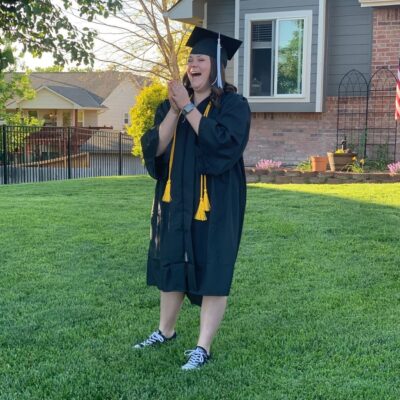
At the end of the year, Stallard’s class organized a drive-by parade to celebrate her graduation. She said she was ecstatic and felt like she finally got to say a proper goodbye to her students.
Stallard will begin teaching summer school at St. Margaret Mary School in July and will transition into a second-grade classroom in the fall.
“I think I will miss having a desk right next to someone else in regards to student teaching. My desk was right next to my classroom teacher’s desk, so it was always nice to have someone right there to bounce ideas off of.”
She said she feels confident heading into her new role thanks to her Newman education.
Morgan Owings
Morgan Owings also graduated in May 2020 with her Bachelor of Science in Elementary Education. She student taught in the kindergarten classroom at Earhart Environmental Magnet in Wichita and had a much different experience than Stallard.
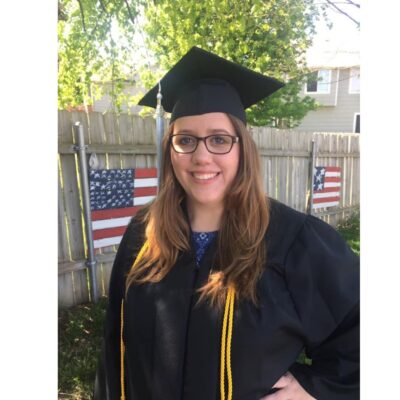
Like most student teachers, Owings was eager to get into the classroom in January and meet her students. Her first week was spent observing and spending some one-on-one time with students. She said her biggest struggle while in the classroom was figuring out a planning method that worked for her. Lesson planning is something that took far longer than she had imagined, she said.
When the news was announced that teachers and students would not be returning to school, Owings was shocked. She said, “Part of me did not believe that COVID-19 would reach the U.S. like it did. Everybody freaked out about Ebola, so I figured coronavirus would be the same thing. Unfortunately, I was wrong.”
The last time she had seen her students was right before she had slipped out of the classroom to get to Newman’s campus for class. She said she was sad she never really got to say goodbye.
Her schedule changed tremendously when COVID-19 hit. Owings found it much harder to stay connected to her classroom and continue to learn teaching methods herself when school went online.
“I went from teaching the whole school day to nothing overnight. I was not included in any meetings because I was not full-time staff. It felt like I was floundering around trying to find the way. No one else knew what they were doing either, but it still felt like I was alone.”
After about a week, her classroom teacher invited her to the class’s Facebook group so she was able to observe posted assignments and virtually keep up with the students as much as possible. She mostly enjoyed seeing posts from parents of their students studying — she said it made her feel a bit more connected.
Owings was tasked with recording math videos that aligned with the curriculum.
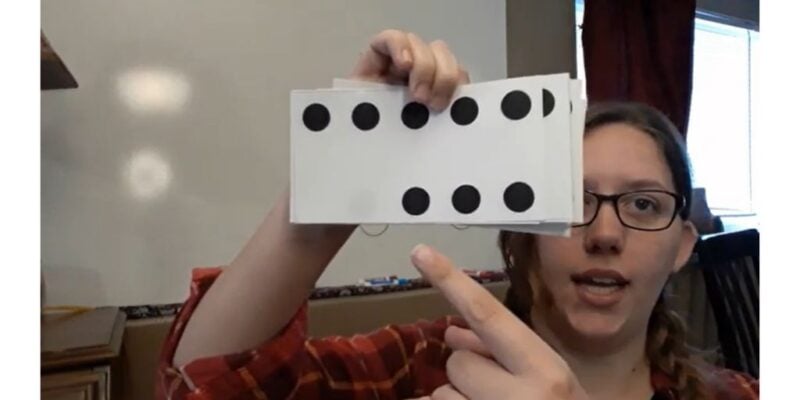
“All of our kindergarten kids had access to those videos. This was hard because I had no idea if anybody understood the concepts. Educational electronics and videos are not engaging to children that young. I started nannying some boys from my preschool (where I worked before student teaching) and videos were hard for them to watch. I stopped fighting them on it and just taught them the same concepts, but without the videos. They learned and responded so much better to me than their own teacher online. I can only assume that the parents and guardians of my kindergarten kids ran into the same problems,” she said.
Though this made her semester more difficult, Owings learned important lessons during the final months of the semester.
“I think this has helped me to see that time is precious. Our kids need us to invest in them fully and completely. I already knew that relationships were important but being separated like this helped to push it to the forefront of my mind. We must be intentional,” she said.
Owings has accepted a position at El Paso Elementary in Derby.
Kaitlyn Blevins
Kaitlyn Blevins attended the Newman University Dodge City outreach location to obtain her Bachelor of Science in Elementary Education. She student taught the fifth-grade class at rural Kinsley-Offerle Elementary School.
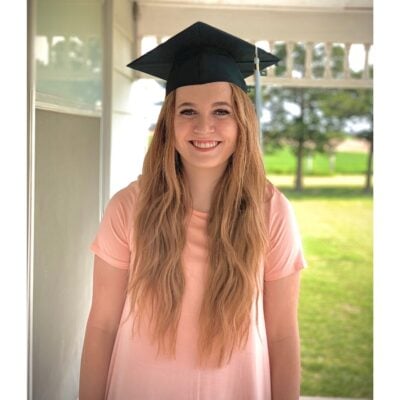
Like Stallard, Blevins was familiar with the school at which she student taught as she had grown up nearby in Lewis, Kansas. She had also been hired in August as a longterm substitute for the school and had a semester of experience in the classroom before her student teaching officially began.
She was nervous and excited to begin teaching in her classroom. She described her first day as the best day of her life.
“I was so nervous but yet so excited to take on my future as an educator. Stepping into the classroom for the first time was very nerve-racking. I spent a lot of time over the summer getting my classroom ready for my first-ever teaching position.”
Blevins had the help of a fellow fifth-grade teacher with a connecting classroom throughout the year. The two would meet weekly to discuss lesson plans.
She technically began her student-teaching in January and the only big change was more in-depth observation by administrators.
“These observations really helped me out in the end because they were very detailed and gave back honest feedback of how to work on different skills in the classroom. Although I didn’t get to work side by side in the classroom with another teacher during my student teaching, I would say I learned more than I ever would have doing it this way. I enjoyed every bit of it,” she said.
Blevins said she was heartbroken when she heard that the school would be shutting its doors for the remainder of the year.

“I never thought that a group of students and I would build the relationships that we did throughout the school year. I had a very hard time with this transition and all I could think about every morning before our Zoom meetings started were which students would be walking up to me around this time to give me a good morning hug if we were still in school the normal way,” she said.
As a first-year teacher, she felt lost when it came to transitioning her lessons online. She quickly realized that every teacher was just as lost as she, but they got through it as a team.
“We were all very stressed about the situation and didn’t know how to quite move forward from this, but honestly just by working together we were able to do better than we all could’ve imagined. We bounced ideas off of one another, tested things out, made a few changes here and there and we were ready to begin teaching our students online,” she said.
That being said, no part of the transition was particularly easy. Blevins said it saddened her to know the students were stuck at home and not able to see their friends every day. The logistics of teaching her students virtually was also hard but she was thankful that she had fifth-graders that knew and understood technology. “We still ran into some problems here and there but nothing too big,” she said.
Her own experience taking online college courses and attending the Dodge City outreach center also helped her strategize tremendously. “I never would’ve been able to do it without the education I gained from Newman University,” she said.
Blevins held a required Zoom meeting every day with her students. During that time they did their daily reading lesson and spent any extra time interacting and engaging with each other.
“It was so important to me that the students interact and talk to one another because I know they were struggling. I also had 1.5 hours on Zoom that were considered my office hours. During this time any student of mine could log onto Zoom and ask any homework questions they may have had or just to talk. Several different times I had students log on just to talk to me or to see what other classmates of theirs were online. My students had a very tight relationship and so they really enjoyed each other’s company and just being able to see each other. I could tell they missed each other very much,” she said.
Blevins has plans to obtain her master’s degree soon but first, she has big summer plans. She will get married Aug. 1 and will enter the kindergarten classroom at Offerle as Mrs. Welch that same month.
The Newman experience
Not only did university students miss their student teaching classrooms, they also missed their peers at Newman during this time. With such a small class size, students easily became friends.
Stallard said, “For the last two years I have had the same classes, four days a week with the same 18-20 people, so it was hard to not have that comradery with them as often as we used to.”
Stallard, Owings and Blevins expressed gratitude toward the Newman University education program faculty and curriculum.
Owings was homeschooled before attending college and had always relied on learning things for herself. “Newman opened my eyes to a lot of what I did not know. … Newman gave me the ability to keep differentiation and accommodation at the forefront of my mind for every student, not just those on Individualized Educational Programs or Plans,” she said,
She often went to her advisor, Associate Professor of Education Huachuan Wen, for advice and assistance with her work and was thankful for his availability.
“A lot of people say, ‘let us know how it goes,’ and they do not mean it. The professors at Newman say it and mean it with their whole hearts. For the professors we see on a day-to-day basis, we matter. We have always mattered,” said Owings.
Stallard agreed and said, “I love that all my professors know who I am, they ask me how things in my life are going. They are always there if I have a question. I have loved being part of the School of Education.”
Stallard added, “The School of Education pushes us hard, but because of that, I am so prepared. … Newman taught me how to network and be confident in what I knew. What I was learning in the classroom at night, I was able to turn around an implement later that week. Newman also made sure we always had a support system, and that is something that I will carry on into my own classroom. I definitely knew I was never alone.”
Blevins was most thankful for the observation hours and convenient class times at Newman.
“If it wasn’t for me spending time observing different schools and teachers, I never would be where I am today. Newman also helped me by having evening classes so I was able to substitute (teach) during the day. This helped me understand different grade levels and standards that each grade required. Newman did an amazing job preparing me for my future career and helping me get placed where I am today,” she said.
Advice for Future Teachers
Owings advises future teachers to follow Gerry Brooks, Teacher Tales with Miss Smith, Bored Teachers and Devin Diebold on Facebook.
“They are all teachers and administrators who make funny videos dealing with teaching. Devin has a podcast, ‘Crying in My Car,’ which is hilarious. It is a great way to see the humor in not so humorous situations,” she said.
Owings began college as an English major, changed to sociology and knew she was settling so she eventually decided to pursue teaching after hearing some eavesdropped advice from a random stranger in Starbucks. He had said, “If you are not passionate about it, don’t even consider it.” And that’s all it took for Owings to realize she wanted something different and motivated her to change course.
“Teaching is a calling,” she said. “If you want to be a teacher, do not let anything stop you. We need good teachers in our world. One thing that I have always loved was the fact that everybody pitches in to help everybody. It does not matter if you are in the same school or across the world. We are here for each other.”
Stallard echoed Owings saying, “Teaching is a calling. It challenges me every day, but I couldn’t picture myself doing anything different. If you think you want to teach, take some classes, see if you like it. If you realize you aren’t in love with it, that’s OK, too. This is one of the hardest jobs I have ever done, but it is so rewarding.”

